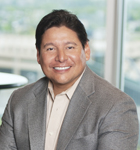When current president Otto Merida cofounded the Las Vegas Latin Chamber of Commerce with Arturo Cambeiro in 1976, the reasoning was simple: creating a Latino organization with economic power would translate into social and political power. At the time, there were only 30,000 Hispanics in Southern Nevada. Currently, that number hovers around 550,000 and Hispanic entrepreneurs account for at least 4,000 local businesses. Clearly, Merida and Cambeiro were ahead of their time.
According to Merida, the Hispanic business community in Las Vegas has come a long way, but their biggest challenge is coming out of the shadow of the city’s world-famous hospitality and gaming industries. The key, says the president, is diversifying the economy. To achieve this, the Las Vegas Convention and Visitors Authority is promoting international tourism trade by partnering with airlines such as Copa from Panama City to schedule direct flights into Las Vegas. The chamber and the Las Vegas Convention and Visitors Authority are leading the way in the fight to bring more international airlines with direct flights to Las Vegas in the hope that it will open up new business.
“We already have over 7,000 conventions a year in this city and if we can bring in enough international travelers, we can be the international business headquarters of the West,” Merida says.

The problem with relying so heavily on the hospitality and gaming industries is that when tough economic times present themselves, the city will take a major hit—and that’s exactly what happened during the recession. Las Vegas saw a decrease of three million tourists and that tremendously hurt the small, Hispanic-owned businesses in the area that the chamber represents. Southern Nevada is making a speedy comeback, but Merida believes Las Vegas needs to reshift its focus. Thus, the creation of the newly built Smith Center, a world-class performing arts center, and the Larry Ruvo Brain Institute, which will bring in “medical tourism.” The city is making a conscious effort to veer away from mere entertainment and enter the world of the arts and medicine, hoping to bring more culture and visitors to Las Vegas, he adds.
“These are areas in which Las Vegas was really failing,” Merida says. “The performing arts center and the institute investigating Alzheimer’s and [other forms of] dementia are steps to fixing the problem. These types of endeavors will attract new tourists, leading to a new future for Las Vegas.”

